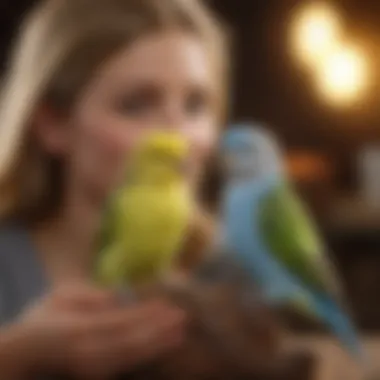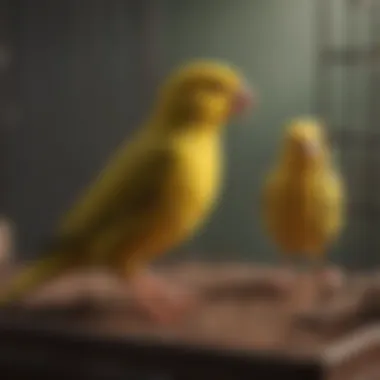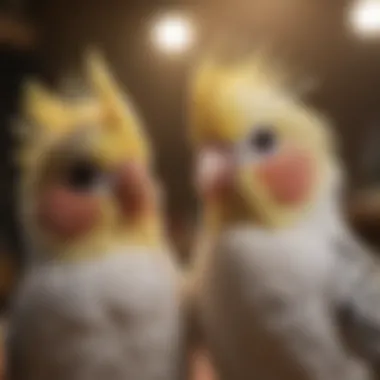Best Beginner Birds: A Guide for New Avian Owners


Intro
Choosing a pet bird is an exciting decision, but it comes with its own set of challenges and responsibilities. For those who are new to avian care, understanding the specific needs and habits of bird species is crucial. This article aims to become a vital roadmap for individuals looking to embark on this journey, helping them choose the right feathered friend.
Avian Care Basics
Beginning with the basics of avian care sets the foundation for novice bird owners. Each bird species differs in nutritional, habitat, and social needs, making it imperative to grasp their unique requirements.
Importance of Proper Nutrition
Nutrition forms the backbone of bird care. Birds require a balanced diet that typically consists of high-quality pellets, fresh fruits, and vegetables, alongside occasional seeds. A diet lacking essential nutrients can lead to health problems over time. Each species has its own dietary essentials that future owners must understand.
Understanding Bird Species and Their Needs
Different species exhibit varying behaviors and preferences. For instance, parakeets thrive in social settings and need ample interaction, whereas finches are more independent. Recognizing these traits can significantly impact a bird's quality of life. Knowledge about each species facilitates a tailored environment that caters to their wellbeing.
Basics of Birds Habitat Setup
Setting up a suitable habitat is crucial. A spacious cage, appropriate perches, and safe toys are fundamental. Researching the particular needs, such as cage size and interior design, helps create an engaging environment. Specific considerations for the type of bird will lead to a more satisfying experience for both pet and owner.
Grooming and Hygiene Tips
Grooming is vital for maintaining bird health and wellbeing. Regularly trimming nails, routine beak maintenance, and occasional baths help prevent issues. Cleaning the cage frequently reduces stress on the bird caused by clutter and mess. Proper hygiene practices strengthen the bond between bird and owner as care becomes part of daily life.
Interacting with Your Pet Bird
Interaction shapes the relationship between a bird and its owner. How you engage with your pet aims to build a trustful connection and to promote daily mental stimulation and exercise. Effective interaction results in a well-adjusted bird ready to share its personality.
Building Trust and Connection
Earning a bird's trust is a process. Slowly introducing your presence and using consistent, gentle tones will facilitate the development of trust over time. Negative experiences can lead to heightened fear or aggression. Patience is key to nurturing this relationship.
Training Techniques and Tips
Training your bird is beneficial for both parties. Basic commands and fun tricks stimulate the bird intellectually while deepening the connection between owner and pet. Positive reinforcement, such as providing treats, encourages birds to learn desired behaviors. Simple, directed sessions yield the best results.
Fun Activities for Bird Owners and Their Birds
Birds require constructive activities just like humans. Providing interactive toys helps stimulate their minds, while out-of-cage time allows for exercise and exploration. Consider creating a bird-friendly play area filled with perches and toys to keep them engaged.
Recognizing Bird Cues and Behaviors
Getting to know bird signals and expressions can guide in understanding their state of mind. Recognizing when they are happy, scared, or bored will improve the way owners respond to their needs.
Emotional Well-Being of Birds
Birds, like other pets, have emotional needs that must be addressed. Satisfying these needs creates a content and healthy companion.
The Role of Play and Socialization
Social interactions are vital for a bird's happiness. Engaging with your bird through playtime encourages bonding and reduces loneliness. Birds often flourish in a dynamic environment where they can explore and express themselves freely.
Enhancing Birds' Emotional Health
Building a routine can help reinforce stability for your bird. Provide opportunities for mental stimulation and various social interactions to cultivate an emotionally fulfilling atmosphere.
Assessing Bird Stress and Remedies
Recognizing signs of stress—such as excessive preening or aggressive behavior—can mitigate potential issues. If stress occurs, providing comforting objects like blankets or quiet time may help alleviate the situation while reassessing any environmental factors that contributed to it.
Building Strong Human-Bird Bonds
Relationships with birds take effort and patience. Simple acts, such as daily speaking or feeding routines, contribute to forging a lasting bond. Trust and affection grow naturally within a compliant environment.
Bird Health and Safety


Understanding health and safety concerns is a pivotal part of responsible bird ownership. Safeguarding your bird enables a longer, happier life.
Common Health Issues and Prevention
Certain species are more susceptible to health issues than others. Key preventive measures include recognizing applicable symptoms, ensuring proper diet, and maintaining a clean environment. Owners must familiarize themselves with issues prevalent within the species they choose.
Routine Veterinary Care
Regular check-ups can preempt countless problems. Integrated vet consultations ensure timely vaccinations and check for underlying health concerns, which it helps encode a protocol for optimal bird care.
Environmental Hazards to Avoid
Protecting your bird from everyday house hazards is essential. Common items, such as houseplants, certain foods, and airborne toxins, can endanger avian companions. Recognition of high-risk items entered into homes during the bird's adjustment period is beneficial.
Signs of Illness or Distress
Birds exhibit cues for discomfort—ranging from decreased vocalizations to sluggish behavior. Early detection of any signs can ensure prompt interventions, which translates into effective healthcare decisions and action.
Fun Facts and Quirky Insights
Encouraging curiosity about birds provides an enriching experience, leading to a more profound appreciation.
Unique Traits of Popular Bird Species
From the affable budgerigar to the brightly colored cockatiel, each bird species brings something special. Their behaviors, abilities, and adaptability to human environments enrich the tapestry of avian interaction.
Historical and Cultural Significance of Birds
Throughout history, birds have captivated cultures and inspired symbolism. Artists, poets, and philosophers all turned to the avian realm for reflection and creativity. Exploring these cultural ties can foster greater reverence for our avian companions.
Famous Bird Owners and Their Stories
Celebrities and influencers have flaunted their avian friends, shining a light on diverse bird breeds while sharing their positive experiences. Tracking the journeys of these famous bird owners may appeal and resonates with potential pet owners for avian companionship stories.
Birds offer profound joy and companionship, encouraging owners to embrace the nuanced responsibilities that accompany their care.
Understanding the Basics of Bird Ownership
When considering bringing a pet bird into your home, it is crucial to understand the foundations of bird ownership. This understanding sets the stage for responsible ownership and allowing both you and your bird to thrive together. Owning a bird requires more than just enjoying its beauty; it involves a commitment to its care and well-being. The choice of bird species is fundamental, with each having unique characteristics and needs. Therefore, learning about these can prevent mismatches that can lead to frustration or dissatisfaction.
Knowledge of specific species will help you identify their habitats, dietary preferences, and social requirements. Investing time in this understanding is beneficial as it prepares you for the realities of bird care. Thus, allowing for a more enriched environment that fosters interaction and companionship.
The Importance of Choosing the Right Bird
Selecting the appropriate bird species is paramount for new owners. Each bird has its behavior and living requirements, and these can significantly affect how they adapt to your lifestyle. If you choose a bird that thrives in a busy, social environment but you prefer a quiet household, both your expectations and the bird's happiness can be compromised.
A few preferred species for beginners are parakeets, cockatiels, and canaries. They tend to have manageable care needs and are generally more forgiving of novice mistakes. Consideration of the bird's life expectancy is important too; some species live for decades, making them a long-term investment in terms of time, emotion, and finances.
Prior to making a decision, think about your daily routine, available space, and potential disturbances in your environment.
Common Misconceptions about Pet Birds
There are several common myths about owning birds. For instance, some people believe that all birds require constant attention. While social birds like parakeets or lovebirds thrive on companionship, many species, such as canaries, are content with less interaction. It is essential to match your expectations with the bird's natural social behavior.
Another misconception is that birds can easily be left alone for long periods. Birds can become lonely and stressed when left unattended for extended periods. Building a proper social structure and offering enrichment is vital when managing their well-being.
Consider that birds are not merely decorative pets but sentient beings with social needs and unique behavioral traits. Addressing these misconceptions allows aspiring owners to develop informed care strategies that enrich both their lives and those of their avian companions.
Factors to Consider Before Getting a Bird
Choosing to bring a bird into your home is not a decision to be taken lightly. This section highlights important factors that any aspiring bird owner should evaluate before making a commitment. Recognizing the nuances of avian care ensures that both the owner and the bird can enjoy a harmonious relationship. Bird ownership can be a rewarding venture, but it comes with distinct responsibilities. Understanding these factors allows potential owners to prepare adequately.
Time Commitment for Bird Care
Birds require a daily time commitment that often surprises first-time owners. Unlike other small pets, birds are social creatures who thrive on interaction. Consequently, bringing a bird into your life requires more than just providing food and water daily.
Exploring your time availability for play, training, and maintenance of their environment is crucial. Familiarize yourself with the intricacies of bird care routines, as these routines will impact their overall well-being. For instance, cleaning the cage, providing mental stimulation, and recognizing any health complications necessitate about 1 to 2 hours of undefined engagement daily. It can be beneficial to ensure that multiple members in your family can participate in care to maintain a healthy bond with the bird.


Space Requirements for Different Species
Space should not be underestimated when considering a bird for your household. Not every bird species has the same spatial needs. Larger bird species like African Grey Parrots or Macaws require much larger cages and play areas compared to smaller species such as Budgerigars or Canaries.
It's essential to assess your living environment thoroughly. Here are some key considerations:
- Cage Size: Generally, the larger the cage, the better it accommodates the bird's energy levels and behavior. Know the minimum recommended size for the species you desire.
- Social Interaction Zones: Birds enjoy exploring outside of their cages. Make sure you have safe zones in your home where you can supervise their play.
- Safety: Look around your space to find any potential hazards that could injure the bird when they are out and about.
By thoughtfully planning for adequate space and safety, your new feathered friend can roam and exercise freely, making for a happier pet.
Budgeting for Bird Care
Financial considerations also form a core part of the decision-making process. Unlike some pets, which may appear lower in cost initially, birds can be surprisingly expensive over time.
Let's delve into the commonly overlooked aspects of bird ownership budgeting:
- Initial Costs: Birds might seem cheap to purchase, however, cages, feeders, toys, and food add up.
- Regular Maintenance: Food quality is crucial. High-quality pellets, fresh fruits, and vegetables are essential, and can be more costly.
- Health Care: Routine vet check-ups and possible emergencies increase expenses significantly over ownership.
Take the time to account for these factors, as this will avoid financial strain later. By doing so, you can uphold the standard of care that every bird deserves.
It is important not just to check your budget once, but to create a long-term plan to cover ongoing care, supplies, and health needs. Thorough financial planning promotes a stable environment for your bird, making ownership much more fulfilling.
Recommended Bird Species for Beginners
Choosing the right bird for beginners is paramount, as different species come with distinct traits and requirements. A suitable bird can enhance the owner's experience and lead to a fulfilling companionship. Within this section, we will explore several bird species that fit well into the lives of novice avian caretakers. Each bird's specific attributes, such as ease of care, social characteristics, and interaction levels, will be discussed. Incorporating these factors can aid aspiring bird owners in making informed decisions about their future pets.
Parakeets: A Versatile Choice
Care Requirements
Parakeets are an ideal entry point for new bird owners. They are relatively easy to care for and adapt well to various living conditions. The initial setup involving a suitable cage and accessories is crucial. Adequate space is necessary but does not have to be overly expansive. This blend of ease in care makes parakeets a popular choice. However, potential owners should know their specific dietary needs, requiring a balanced mix of seeds, pellets, and fresh fruits and vegetables. This diet promotes a health status, further emphasizing why parakeets are favored for beginners.
Social Behaviors
Social behaviors in parrots can vastly enrich the owner's experience. Parakeets, known for their slighlty gregarious nature, are highly interactive birds. This urge to socialize encourages owners to engage regularly, promoting a deeper bond. Their playful mannerism can be a great form of lightweight entertainment. However, owners should consider that parakeets require daily interaction to stave off loneliness, proving beneficial yet demanding in eual measure.
Cockatiels: Companionship and Affection
Vocalization and Interaction
When exploring bird ownership, cockatiels stand out for their charming vocalizations. These birds possess robust abilities for sound mimicry and can develop a repertoire that positively engages their owners. Their social interaction needs can often encourage bonding, making the birds feel less like pets and more like companions. However, loud vocalizations may pose problem for owners in quiet living areas.
Feeding Needs
In terms of feeding needs, cockatiels are considered straightforward. A healthy diet composed primarily of high-quality pellets combined with occasional fresh produce suffices. Providing variety helps to keep them engaged during mealtime and ensures that they are receiving balanced nutrition. Therefore, ensuring a suitable diet, remains the primary point each owner must pay attention to, which is a manageable task.
Lovebirds: Exploring Their Social Nature
Pair Dynamics
Lovebirds showcase intricate social behaviors oriented around their pairing and interactions. Their natural tendency to bond closely with other birds or their owners underscores their affectionate nature. This bonding, however, requires commitment and the potential responsibility of managing pairs or groups. While they add vibrancy to any environment, they can also exhibit jealous behaviors if not properly socialized; hence, new owners must be attentive to these interactions.
Environmental Enrichment
In keeping lovebirds stimulated, environmental enrichment becomes critical. Graduating from basic cages to complex habitats engages their desire for exploration. Toys, perches, and occasional supervised out-of-cage time enhance their contentment. However, owners must consider that the effort needed to maintain this stimulation is higher compared to less social birds. Yet, this ensures a well-rounded and happy psychological state for the lovebirds.
Canaries: The Low-Maintenance Companion
Distinctive Traits
Known for their beautiful song, canaries present a distinctive trait that most bird lovers value. Their pleasant chirps provide a soothing atmosphere and can bring limitless joy. They require less hands-on interaction than other species. A visually striking wall-mounted or stand-alone enclosure is often sufficient for their needs. However, selecting the right canary type helps to ensure a singer that matches the homeowner's intent; understanding this characteristic is important.
Cage Setup
Canaries do require an appropriate cage, but not as large as that for many parrots. They typically thrive in a space that allows comfort and security. Proper cage setup involves considerations on size and location to avoid stress in birds. This setup makes them perfect for individuals living in schedule-bound lifestyles since ongoing attention is less critical. The lack of complex social introduction enhances their appeal for a more relaxed experience.


Essential Bird Care Practices
Caring for a bird encompasses several elements that are crucial to its well-being and quality of life. Understanding these essential care practices is necessary for anyone looking to keep a pet bird. Each bird species has specific requirements, and knowing how to provide for these can greatly improve your bird's happiness and health.
Creating a Suitable Habitat
Optimal Cage Size
Optimal cage size is not just about space; it is fundamental to the welfare of your bird. Depending on the species, larger cages are always better since they allow birds the freedom to stretch their wings and move about with ease. Generally, more room in the cage promotes exercise, reduces stress, and encourages natural behaviors. It is advisable to consult specific requirements for the species you choose. Larger cages also facilitate the addition of toys and perches that enrich the bird's environment. However, cost can be one tricky aspect to consider, as more extensive cages often come with increased uncertain budgets.
Essential Accessories
Essential accessories make up a vital part of creating a stimulating habitat. Items like perches, toys, and food and water bowls enhance the environment. Accessory choices should always be tailored to meet your bird's needs; for instance, the material of a perch may affect foot health. Due to caring for pet birds often requiring an understanding of various behaviors, keeping an enriched environment can alleviate signs of boredom. However, be mindful of selecting safe, non-toxic materials for toys to ensure your bird stays out of harm’s way.
Nutrition Guidelines for Pet Birds
Balanced Diet Basics
Blackened diet basics are critical for the health and activity level of your pet bird. A varied diet, including seeds, pellets, fruits, and vegetables, ensures adequate nutrient intake. Each species may have different dietary needs; thus, it is wise to research which food types suit your particular bird best. Engaging in this practice not only enhances the lifespan of your bird but also promotes a radiant plumage and energetic behavior. Tho yes, havin a balanced diet tends to reqire some effort in food preparation and meticulous choice.
Common Foods to Avoid
Common foods to avoid are just as important as knowing what to feed your bird. Certain foods can be toxic—such as avocados, caffeine, or alcohol. Awareness around these hazards is crucial for preventing serious health issues. Creating a food calendar or list can help keep track of safe and unsafe items. By not overwhelming yourself, it can additionally monitor the diet regardless of the body simply neglecting it.
Health Monitoring and Veterinary Care
Recognizing Illness Signs
Recognizing illness signs encourages a thicker understanding of your bird’s behavior and activity. Behavioral changes, such as a lack of vocalization or fewer movements, can signify an underlying problem. Keeping track of feather quality and appetite is also crucial for monitoring. Noticing these changes early allows for intervention before issues become more serious. Though, not every small indication should cause alarm; proper observation is necessary to tailor responses effectively.
Routine Check-Ups
Routine check-ups form a preventative approach to your bird's health. Regular visits to a veterinarian capable of treating avians ensure early detection of potential issues. Setting annual schedules typically aligns with vaccinations or initial health assessments. Just implementing the idea of routine check-ups can greatly improve quality of life and extend lifespan by shedding light on health complications that might otherwise go unnoticed.
Fostering a Strong Bond with Your Bird
Creating a strong relationship with a pet bird is a crucial aspect of bird ownership. Birds, like other pets, require attention and care, but they also thrive on companionship. A well-established bond influences the overall happiness and well-being of both the bird and the owner. New bird owners should consider specific methods to engage, understand, and love their feathered friends. By fostering positive interactions, one cultivates a trust that can play a significant role in rewarding experiences.
Understanding Bird Behavior
Body Language Interpretation
Body language is a vital component of avian communication. Each bird expresses itself through varied non-verbal signals, including posture, movement, and even feather condition. Recognizing these signs enhances a bird owner's capacity to understand their pet's emotional state. For example, a relaxed bird often exhibits a calm posture with feathers softly resting. In contrast, ruffled feathers may signal distress or discomfort.
Understanding body language enables better responses to the bird's needs. This aspect of interpretation is not merely a bonus but a necessity for ensuring well-being. Successfully interpreting subtle cues leads to enhanced interactions, involving less stress for both the owner and the bird.
Vocalization Insights
Vocalization is another aspect of avian behavior merit attention. Each species possesses unique vocal patterns, Tonguing not only reveals emotions but also serves as an avenue for interaction. Vocal insights contribute to a richer understanding of what your bird needs at any given moment. For instance, a persistent chirp might indicate loneliness or boredom, and a sudden, loud squawking could signify alarm.
Being attuned to these sounds can transform your communication dynamics. Utilizing them aids in establishing what specific vocalizations mean. Plus, responding appropriately can deepen the bond between owner and bird, allowing for more comprehensive companionship.
Training Techniques for Beginners
Basic Commands
Learning basic commands presents fundamental benefits for bird owners. Teaching simple commands fosters communication and discipline, promoting a positive environment. Birds can learn commands like
Epilogue and Final Thoughts
Bird ownership is not simply a hobby; it is a journey filled with responsibilities and rewards. As this article has discussed, selecting the right bird species, understanding their needs, and cultivating a relationship takes both knowledge and dedication. Parting with misconceptions and embracing the reality of avian care solidifies a solid foundation for new pet owners.
The benefits of owning a bird extend beyond companionship. Birds often bring vibrancy and joy to our lives. However, one must not overlook the associated commitments. For those looking to become committed bird owners, several crucial points merit reflection:
- Understanding specific species’ needs can lead to a fulfilling relationship.
- Developing care routines ensures the health and well-being of the bird.
- Effective training improves the dynamics of human-avian interactions.
Many beginners are attracted by the idea of whimsical chirping or delightful colors. Yet, potential bird owners should consider compatibility with their lifestyle. Factors like time, space, and budget indeed shape the avian experience. Even small legislation, like adopting a no-gifting policy for birds during holidays, goes a long way to ensuring mindful ownership.
Birds rely on their caregivers for social interaction. Attempting to understand their behavior and communication will strengthen connections. Thus, it is essential to invest effort and keep learning. Resources are available for continuing education, such as relevant books or online communities like Reddit. An up-to-date knowledge base can also assist in addressing ongoing doubts and situations that arise.
Committed pet ownership extends beyond mere satisfaction of surface-level needs. Rather, it involves a continuous, evolving process of learning and adapting.
In the end, the pleasure that comes from observing your bird flourish and grow alongside your bond is immeasurable. Every individual's journey in pet keeping may differ. However, the main takeaway - promoting informed choices during the initial phase will likely lead to a thriving life shared with an avian companion. Aspiring avian owners must keep it center: their investment of time and energy into bird care will yield joyful and rewarding experiences in return.















